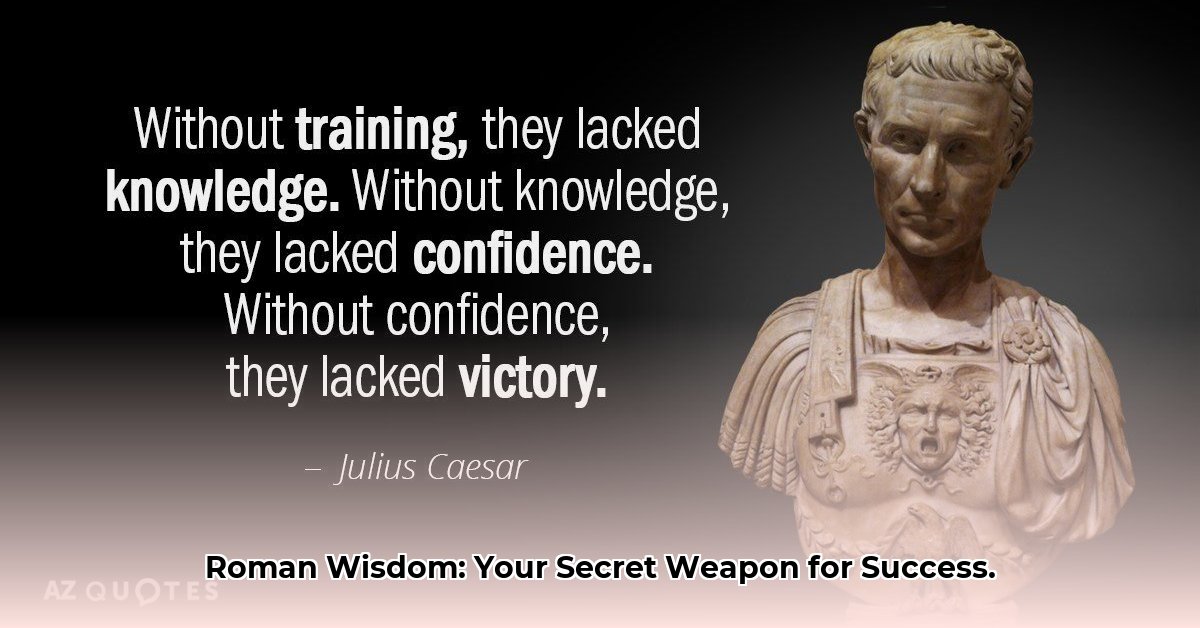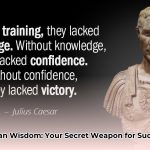In an era defined by constant change and relentless innovation, the foundational wisdom of ancient civilizations might seem distant. Yet, the Romans, master builders of a vast empire and originators of enduring legal and philosophical systems, distilled profound truths about human nature and effective living into concise, powerful sayings. These timeless Latin phrases are far from mere historical curiosities; they offer practical, actionable intelligence for navigating the complexities of contemporary life. This article explores a selection of these impactful Roman maxims, revealing how their age-old insights can empower individuals to cultivate personal growth, enhance well-being, and achieve decisive, lasting success in today’s world. You can explore more Roman quotes as well.
Enduring Roman Maxims for Personal and Professional Mastery
The enduring relevance of Roman philosophy, often encapsulated in short, potent expressions, lies in its direct applicability. From personal development and mental fortitude to strategic thinking and ethical conduct, these maxims provide a robust framework for a more purposeful and impactful existence.
Seize the Day, Embrace the Present: Carpe Diem
Perhaps the most universally recognized Roman legacy, “Carpe Diem,” translating to “seize the day,” is a powerful exhortation to live fully in the present. Penned by the lyrical poet Horace in his Odes (circa 23 BCE), the full line, carpe diem, quam minimum credula postero (“seize the day, putting as little trust as possible in the future”), emphasizes the fleeting nature of time and the futility of deferring opportunities to an uncertain tomorrow. This proverb encourages decisive action, mindful engagement with current experiences, and the recognition that the opportune moment is often right now. For individuals seeking to maximize their potential and find joy, Carpe Diem champions a proactive stance against procrastination and missed opportunities.
Actionable Application for Modern Life:
1. Prioritize Immediate Action: Identify one important task or personal goal you’ve been deferring. Take a concrete step towards completing it today, even if it’s small.
2. Practice Mindful Presence: During routine activities like eating or walking, consciously engage all your senses. This helps anchor you to the present and reduces mental distractions.
3. Embrace Spontaneity (Thoughtfully): When an unexpected, positive opportunity arises—a chance to learn a new skill, connect with someone, or experience something new—evaluate it quickly and commit to engaging rather than overthinking it and letting it pass.
To the Stars Through Adversity: Ad Astra Per Aspera
The inspiring phrase “Ad Astra Per Aspera,” meaning “to the stars through difficulties,” embodies the quintessential Roman spirit of resilience, ambition, and perseverance. While its exact origin is debated, it has become a widely adopted motto for organizations and individuals committed to lofty goals despite daunting challenges. This proverb profoundly reminds us that significant achievements, profound personal growth, and lasting success rarely come without struggle. It serves as a testament to the belief that the path to greatness is often arduous, but the very act of overcoming adversity refines character, strengthens resolve, and makes the eventual triumph more meaningful.
Actionable Application for Modern Life:
1. Reframe Challenges as Growth Opportunities: When encountering an obstacle, view it not as a roadblock, but as a chance to develop new skills, resilience, and creative problem-solving abilities.
2. Break Down Overwhelming Goals: For any daunting objective, divide it into smaller, more manageable milestones. Celebrate the completion of each micro-step to maintain momentum and build confidence.
3. Cultivate a Growth Mindset: Embrace the belief that your abilities can be developed through dedication and hard work. See failures as learning experiences that pave the way for future success.
A Sound Mind in a Sound Body: Mens Sana in Corpore Sano
“Mens Sana in Corpore Sano,” translating to “a sound mind in a sound body,” is a foundational concept from the Roman satirist Juvenal, found in his Satires (circa 1st-2nd century AD). This maxim underscores the profound and inseparable relationship between physical and mental well-being. This ancient concept, emphatically supported by contemporary neuroscience and psychology, stresses that genuine health, peak performance, and overall happiness stem from nurturing both aspects harmoniously. Neglecting one invariably impacts the other, diminishing overall vitality and productivity.
Actionable Application for Modern Life:
1. Integrate Consistent Movement: Dedicate time daily to physical activity. Whether it’s a brisk walk, a structured workout, or active hobbies, regular movement boosts both physical vitality and mental clarity.
2. Prioritize Mental Rest and Stimulation: Allocate time for activities that both calm and stimulate your mind, such as meditation, reading, learning a new skill, engaging in creative pursuits, or spending time in nature.
3. Fuel Your Body and Mind: Make conscious dietary choices that support sustained energy and optimal cognitive function. A balanced diet rich in whole foods and adequate hydration serves as essential fuel for both brain and body.
If You Wish for Peace, Prepare for War: Si Vis Pacem, Para Bellum
“Si Vis Pacem, Para Bellum,” meaning “If you want peace, prepare for war,” is a principle of strategic foresight articulated by the Roman military writer Vegetius in his treatise De Re Militari (4th or 5th century CE). While originating in a military context, its broader application urges proactive preparation to mitigate potential future challenges across all domains of life. It encapsulates the wisdom of building resilience, developing contingency plans, and understanding that readiness can often deter adversity or minimize its destructive impact, fostering a more stable and secure future.
Actionable Application for Modern Life:
1. Conduct a Personal Risk Assessment: Objectively evaluate potential vulnerabilities in your finances, career, health, or relationships. Anticipate challenges before they manifest.
2. Develop Proactive Contingency Plans: For identified risks, outline specific backup strategies. This might include building an emergency savings fund, acquiring new skills to adapt to market changes, or nurturing a robust support network.
3. Invest in Preventative Measures: Prioritize actions that prevent problems rather than merely reacting to them. This applies to health routines, financial planning, and continuous learning.
Time Flies: Tempus Fugit
The succinct yet profound phrase “Tempus Fugit,” or “time flies,” is derived from the Roman poet Virgil’s Georgics (circa 29 BCE), specifically the line fugit inreparabile tempus (“irreparable time flies”). This proverb serves as a stark reminder of the finite nature of time and its relentless, unrecoverable passage. Far from being a source of anxiety, this wisdom encourages a conscious appreciation for the present and a deliberate, values-driven approach to how one spends their precious moments. It prompts deep reflection on personal priorities, the pursuit of meaningful endeavors, and the importance of seizing the opportunities that time presents.
Actionable Application for Modern Life:
1. Conduct a Time Audit: For a week, meticulously track how you allocate your hours. This provides an objective picture of where your time truly goes and illuminates areas for realignment.
2. Align Actions with Core Values: Reflect deeply on your core values and long-term aspirations. Adjust your daily schedule to dedicate more time to activities that genuinely align with these, consciously reducing engagement with distractions that offer little long-term value.
3. Practice Deep Work: When engaged in important tasks, minimize distractions and focus intently on one thing at a time. This maximizes productivity and creates a sense of accomplishment, making the most of your allocated time.
Divide and Conquer: Divide et Impera
“Divide et Impera” (“divide and conquer”) is a strategy often attributed to the Roman general and statesman Julius Caesar, or sometimes to Philip II of Macedon, and later widely practiced in Roman imperial policy. While notorious in political and military contexts, this maxim offers practical wisdom for individuals tackling complex tasks or overwhelming challenges. When faced with an intimidating objective, breaking it down into smaller, more manageable components makes it less daunting, clarifies the path forward, and facilitates a systematic, efficient approach to resolution.
Actionable Application for Modern Life:
1. Deconstruct Large Projects: For any significant goal or project, break it down into a series of distinct, bite-sized tasks. This transforms a monolithic challenge into an attainable series of steps.
2. Focus on Sequential Completion: Prioritize and concentrate on completing one small task at a time, moving methodically through the overall plan. This single-task focus prevents overwhelm and builds momentum.
3. Embrace Incremental Progress: Acknowledge and celebrate the completion of each mini-task. This consistent sense of achievement fuels motivation and makes the overall objective feel genuinely achievable.
Let the Buyer Beware: Caveat Emptor
“Caveat Emptor,” or “let the buyer beware,” is a foundational principle of Roman commercial law, emphasizing the buyer’s responsibility for due diligence before a purchase. This wisdom extends far beyond mere commerce, urging individuals to exercise caution, conduct thorough research, and approach claims with a healthy skepticism, whether in financial dealings, information consumption, or crucial personal decisions. In an age of abundant (and often misleading) information, Caveat Emptor encourages critical thinking and informed choice.
Actionable Application for Modern Life:
1. Conduct Comprehensive Research: Before making significant purchases, committing to new ventures, or accepting information as fact, actively seek out independent reviews, compare multiple options, and consult trusted, unbiased sources.
2. Cultivate a Skeptical Mindset: Do not accept information, especially online, at face value. Practice questioning narratives, considering underlying motivations, and demanding evidence to support claims.
3. Seek Diverse Perspectives: Before forming a conclusion on important matters, gather opinions and insights from a variety of sources to gain a more complete and nuanced understanding, minimizing blind spots.
Bread and Circuses: Panem et Circenses
“Panem et Circenses,” meaning “bread and circuses,” is a phrase coined by the Roman satirist Juvenal in his Satires (early 2nd century AD). It refers to the strategy of pacifying a populace by providing basic necessities (like food) and superficial entertainment (like gladiator games in the Colosseum or chariot races in the Circus Maximus) to distract them from more significant societal or political issues and prevent dissent. This concept remains remarkably relevant today, serving as a powerful reminder for individuals to maintain critical awareness and avoid passive consumption of distractions that might divert attention from important personal goals or broader societal concerns.
Actionable Application for Modern Life:
1. Evaluate Your Information Diet: Be discerning about where you get your news and entertainment. Prioritize reliable, in-depth sources that encourage critical thought over sensationalism or oversimplification.
2. Engage Critically with Media: Do not passively consume media. Actively question narratives, consider the underlying motives of content creators, and analyze the broader implications of what you consume for your own well-being and understanding.
3. Prioritize Meaningful Engagement: Consciously limit exposure to superficial distractions (excessive social media, endless entertainment feeds) and instead dedicate time to activities that foster critical thinking, personal growth, community engagement, or real-world problem-solving.
I Came, I Saw, I Conquered: Veni, Vidi, Vici
Julius Caesar’s iconic declaration, “Veni, Vidi, Vici” (“I came, I saw, I conquered”), was reportedly spoken after his swift and decisive victory at the Battle of Zela in 47 BCE. This powerful phrase epitomizes unparalleled efficiency, clear vision, and confident execution. It is a timeless call to approach challenges with a strategic mindset, a commitment to direct action, and the unwavering conviction to achieve rapid, definitive results. It symbolizes the power of focused effort and the satisfaction of decisive accomplishment.
Actionable Application for Modern Life:
1. Define Your “Conquered” Clear Objective: Before embarking on any task, explicitly define what “conquered” looks like for that particular endeavor. A clear end in mind streamlines the process.
2. Streamline Your Approach: Identify the most direct and efficient path to achieve your goal, proactively eliminating unnecessary steps, distractions, or over-complications.
3. Act with Focused Decisiveness: Once a plan is formed, execute it with unwavering focus, confidence, and agility. Aim for a swift and conclusive outcome, minimizing procrastination and second-guessing.
Make Haste Slowly: Festina Lente
An intriguing paradox attributed to the Roman Emperor Augustus, “Festina Lente” translates to “make haste slowly.” This proverb advocates for a balanced approach to action, urging efficiency and progress while simultaneously emphasizing the critical importance of careful consideration, thoroughness, and avoiding reckless, impulsive decisions. It’s about intelligently combining urgency with prudence, ensuring that speed does not compromise quality or lead to avoidable errors.
Actionable Application for Modern Life:
1. Balance Speed and Quality: When undertaking a task, strive for an efficient pace, but ensure that quality, accuracy, and thoughtful execution are not sacrificed due to undue haste.
2. Implement Strategic Pauses for Reflection: Before making a critical decision or launching a major initiative, take a brief, deliberate moment to reflect, consider all angles, and anticipate potential consequences, even amidst a sense of urgency.
3. Embrace Iterative Improvement: Move forward with projects or plans, but maintain an open mind to feedback, adjustments, and continuous refinement. This allows for progress without stagnation, ensuring optimal outcomes over time.
These profound Roman sayings are far more than linguistic relics; they are powerful, practical tools for navigating the complexities of modern existence. By thoughtfully integrating their timeless wisdom into our daily lives, we can cultivate resilience, foster holistic well-being, make informed decisions, and pursue our aspirations with greater clarity, effectiveness, and enduring success.
Key Takeaways from Roman Wisdom for Contemporary Life:
- Holistic Well-being: True strength and performance arise from the interconnected nurturing of both physical and mental health.
- Proactive Preparedness: Strategic foresight and diligent planning are crucial for mitigating risks and achieving sustained peace and stability, both personally and in broader contexts.
- Decisive Action & Critical Engagement: Genuine progress stems from intelligent, focused action, critical thinking, and active engagement with life, rather than passive consumption or procrastination.
- Resilience and Patience: Great achievements demand perseverance through difficulties, combined with the wisdom to act thoughtfully and avoid reckless speed.
By thoughtfully applying these ancient principles, individuals can unlock powerful strategies for personal growth, effective leadership, and ethical conduct in today’s dynamic world, proving unequivocally that true wisdom is indeed timeless.










